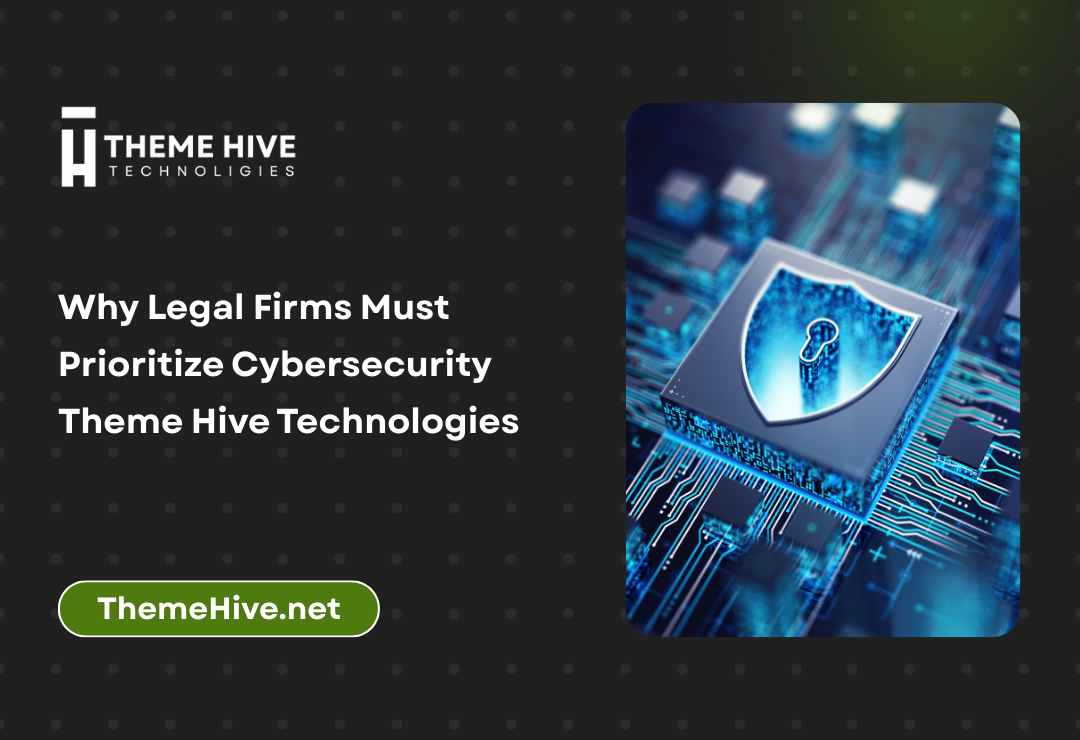The legal industry has become a prime target for cybercriminals, with law firms experiencing data breaches at rates 25% higher than other industries according to American Bar Association cybersecurity reports. Understanding why legal firms must prioritize cybersecurity has become critical for protecting client confidentiality, maintaining professional reputation, and ensuring business continuity. ThemeHive Technologies recognizes the unique security challenges facing legal practices and the urgent need for comprehensive cybersecurity strategies tailored specifically for law firms.
The Unique Cybersecurity Landscape for Legal Firms
Why Cybercriminals Target Law Firms
Legal firms possess some of the most valuable and sensitive information available to cybercriminals. Client files contain personal details, financial records, business strategies, merger and acquisition plans, intellectual property, and privileged communications that command premium prices on the dark web. This treasure trove of confidential information makes law firms irresistible targets for sophisticated cyber attacks.
The attorney-client privilege that protects legal communications also creates an expectation of absolute confidentiality that cybercriminals exploit. When law firm data is compromised, the impact extends far beyond the firm itself to affect clients, opposing parties, and entire business transactions.
The Trust Factor in Legal Services
Legal practices are built on trust, confidentiality, and professional reputation. A single data breach can destroy decades of relationship building and professional standing. Clients expect their legal representatives to maintain the highest standards of confidentiality, and any failure in this regard can result in malpractice claims, regulatory sanctions, and permanent damage to professional reputation.
Theme Hive Technologies has observed that law firms often underestimate the reputational damage associated with cybersecurity incidents. Unlike other industries where customers might continue relationships after security breaches, legal clients typically terminate relationships immediately following any compromise of confidential information.
Current Cybersecurity Threats Targeting Legal Firms
Ransomware Attacks on Law Practices
Ransomware has become the most significant cybersecurity threat facing legal firms, with attacks increasing by over 400% in recent years. These attacks encrypt critical case files, client documents, and operational systems, bringing legal practices to a complete standstill. The time-sensitive nature of legal work makes law firms particularly vulnerable to ransomware demands.
Recent high-profile ransomware attacks on major law firms have demonstrated the devastating impact of these incidents. Beyond the immediate operational disruption, ransomware attacks expose confidential client information, trigger regulatory investigations, and result in significant financial losses from both ransom payments and business interruption.
Business Email Compromise Schemes
Business Email Compromise (BEC) attacks specifically target legal firms through sophisticated social engineering schemes that impersonate clients, opposing counsel, or court officials. These attacks often involve fraudulent wire transfer requests, fake settlement instructions, or requests for confidential information that appear legitimate but are designed to steal funds or sensitive data.
The professional nature of legal communications makes BEC attacks particularly effective against law firms. Attorneys regularly receive urgent requests for financial transactions or confidential information, making it difficult to distinguish legitimate requests from sophisticated fraud attempts.
Data Theft and Corporate Espionage
Legal firms handling high-value transactions, intellectual property matters, or sensitive litigation are prime targets for corporate espionage and data theft. Nation-state actors, competitors, and criminal organizations actively target law firms to gain access to confidential business information, merger details, or litigation strategies.
These sophisticated attacks often remain undetected for months or years, allowing attackers to monitor communications, steal documents, and gather intelligence about ongoing legal matters. The delayed discovery of these breaches compounds the damage and makes containment extremely difficult.
Regulatory and Professional Obligations
Professional Ethics and Confidentiality Requirements
Legal professionals have ethical obligations to protect client confidentiality that extend to cybersecurity measures. State bar associations increasingly require attorneys to implement reasonable security measures to protect client information, and failure to do so can result in professional discipline, malpractice claims, and regulatory sanctions.
The American Bar Association Model Rules of Professional Conduct specifically address technology competence and confidentiality requirements. Rule 1.6 requires lawyers to make reasonable efforts to prevent inadvertent disclosure of client information, while Rule 1.1 requires technological competence in legal practice.
Data Protection Regulations Impact on Legal Firms
Legal firms must comply with various data protection regulations including GDPR, CCPA, HIPAA (for healthcare-related legal work), and state-specific privacy laws. These regulations impose specific requirements for data protection, breach notification, and client consent that directly impact law firm cybersecurity practices.
ThemeHive Technologies helps law firms navigate complex regulatory requirements and implement cybersecurity measures that ensure compliance with applicable data protection laws. Regulatory compliance failures can result in significant fines, professional sanctions, and civil liability.
State Bar Association Cybersecurity Guidelines
Many state bar associations have published cybersecurity guidelines and requirements for legal practitioners. These guidelines typically address password management, encryption requirements, secure communication protocols, and incident response procedures that law firms must implement to meet professional standards.
States like New York, California, and Florida have implemented specific cybersecurity requirements for attorneys, including mandatory training programs and security assessments. The Cybersecurity and Infrastructure Security Agency (CISA) provides additional resources for small and medium-sized law firms.
Financial Impact of Cybersecurity Incidents on Law Firms
Direct Costs of Data Breaches
The average cost of a data breach for law firms exceeds $5.9 million, significantly higher than most other industries. These costs include incident response, forensic investigation, legal fees, regulatory fines, client notification, credit monitoring services, and system restoration expenses.
Law firms face unique cost factors including privilege review processes, opposing party notifications in litigation matters, and specialized legal technology restoration requirements. The complexity of legal data and systems often extends breach response timelines and increases overall costs.
Business Interruption and Lost Revenue
Cybersecurity incidents can completely shut down law firm operations for days or weeks, resulting in significant lost revenue and missed deadlines. Court filing deadlines, statute of limitations requirements, and client obligations cannot be postponed due to cybersecurity incidents, creating additional pressure and potential liability.
The time-sensitive nature of legal work means that even brief system outages can result in missed opportunities, abandoned cases, and client defections. Law firms often struggle to recover lost momentum after significant cybersecurity incidents.
Professional Liability and Malpractice Claims
Cybersecurity breaches can trigger professional liability claims if client information is compromised or legal deadlines are missed due to system failures. Professional liability insurance policies may not cover all cybersecurity-related claims, leaving law firms exposed to significant financial losses.
Clients increasingly include cybersecurity requirements in engagement agreements and may terminate relationships following security incidents. The reputational damage from cybersecurity failures can permanently impact a law firm’s ability to attract and retain clients.
Essential Cybersecurity Measures for Law Firms
Implementing Strong Access Controls
Law firms must implement robust access control measures that restrict system access to authorized personnel and ensure appropriate segregation of client files and confidential information. This includes multi-factor authentication, role-based access controls, and regular access reviews to prevent unauthorized access.
Password management policies should require strong, unique passwords for all systems and accounts. Password managers can help legal professionals maintain security while managing the numerous credentials required for legal practice.
Email Security and Communication Protection
Email remains the primary attack vector for cybercriminals targeting law firms. Implementing advanced email security solutions including anti-phishing protection, email encryption, and secure communication platforms is essential for protecting confidential client communications.
Legal firms should establish secure communication protocols for sensitive matters and train staff to recognize and respond to suspicious communications. ThemeHive Technologies provides specialized email security solutions designed specifically for legal practice requirements.
Data Encryption and Protection
All confidential client information must be encrypted both in transit and at rest. This includes email communications, document storage, backup systems, and mobile device data. Encryption ensures that even if data is stolen, it remains protected from unauthorized access.
Legal firms should implement enterprise-grade encryption solutions that meet professional and regulatory requirements while maintaining accessibility for authorized users. Key management procedures must ensure that encryption keys are properly protected and recoverable when needed.
Backup and Disaster Recovery Planning
Comprehensive backup and disaster recovery planning is essential for law firm business continuity. Backup systems must be regularly tested, geographically distributed, and protected from ransomware attacks through air-gapped or immutable backup solutions.
Recovery planning should address various scenarios including ransomware attacks, natural disasters, and equipment failures. Regular testing ensures that backup and recovery procedures work effectively when needed and that critical legal deadlines can be maintained during system outages.
Technology Solutions for Legal Firm Cybersecurity
Legal Practice Management Security
Modern legal practice management systems offer built-in security features including user access controls, audit logging, data encryption, and secure client portals. However, law firms must properly configure and maintain these security features to ensure effective protection.
Cloud-based legal practice management systems often provide superior security features compared to on-premises solutions, including automatic security updates, professional security monitoring, and disaster recovery capabilities. However, firms must carefully evaluate cloud providers to ensure they meet professional and regulatory requirements.
Document Management System Security
Legal document management systems contain the most sensitive and valuable information in law firms. These systems require specialized security measures including version control, access logging, retention policies, and secure sharing capabilities.
Integration between document management systems and other legal technology platforms can create security vulnerabilities if not properly managed. Regular security assessments and configuration reviews help ensure that document management systems maintain appropriate protection levels.
Client Portal and Communication Security
Secure client portals provide protected channels for sharing confidential documents and communicating about sensitive matters. These portals must include strong authentication, encryption, and audit capabilities to meet professional confidentiality requirements.
Video conferencing and collaboration tools used for client meetings and internal discussions must provide end-to-end encryption and appropriate security controls. The rapid adoption of remote collaboration tools during the pandemic created new security challenges that many law firms continue to address.
Staff Training and Security Awareness
Cybersecurity Training Programs for Legal Staff
Legal professionals require specialized cybersecurity training that addresses the unique threats and requirements facing law firms. Training programs should cover phishing recognition, secure communication practices, incident reporting procedures, and professional ethics requirements related to cybersecurity.
Regular training updates help staff stay current with evolving threats and new security procedures. Theme Hive Technologies develops customized cybersecurity training programs specifically designed for legal professionals and support staff.
Creating Security-Conscious Culture
Building a security-conscious culture requires ongoing communication, leadership commitment, and recognition of security-minded behavior. Law firm leaders must demonstrate commitment to cybersecurity and provide resources necessary for effective security implementation.
Security awareness should be integrated into daily operations rather than treated as a separate concern. Regular security reminders, policy updates, and incident discussions help maintain security awareness throughout the organization.
Incident Recognition and Response Training
Legal staff must be trained to recognize potential security incidents and follow appropriate response procedures. Early recognition and proper response can significantly limit the impact of cybersecurity incidents and prevent minor issues from becoming major breaches.
Response training should address various incident types including phishing attempts, ransomware infections, unauthorized access, and data theft. Clear escalation procedures ensure that incidents are properly reported and managed according to professional requirements.
Vendor Management and Third-Party Risk
Legal Technology Vendor Security Assessment
Law firms rely on numerous technology vendors for practice management, document review, court filing, research, and communication services. Each vendor relationship introduces potential security risks that must be carefully managed through comprehensive vendor assessment programs.
Vendor security assessments should evaluate data protection measures, security certifications, incident response capabilities, and compliance with relevant regulations. Legal firms should require vendors to demonstrate appropriate security measures and maintain professional liability insurance.
Cloud Service Provider Evaluation
Cloud services offer significant benefits for law firms including improved security, disaster recovery, and scalability. However, firms must carefully evaluate cloud providers to ensure they meet professional confidentiality requirements and regulatory obligations.
Cloud provider evaluation should include assessment of data location, encryption capabilities, access controls, audit logging, and compliance certifications. Service level agreements should specify security requirements and incident response procedures.
Managing Outsourced Services Risk
Legal process outsourcing, document review services, and other outsourced functions require careful security management to protect client confidentiality. Outsourcing agreements should specify security requirements, data handling procedures, and confidentiality obligations.
Regular monitoring and assessment of outsourced services help ensure ongoing compliance with security requirements. ThemeHive Technologies assists law firms in developing vendor management programs that balance operational efficiency with security requirements.
Incident Response and Business Continuity
Developing Legal Firm Incident Response Plans
Legal firms require specialized incident response plans that address professional obligations, regulatory requirements, and client notification procedures. Response plans should include immediate containment procedures, forensic investigation protocols, and communication strategies.
Legal incident response plans must consider attorney-client privilege implications, opposing party notifications in litigation matters, and bar association reporting requirements. Plans should be regularly tested and updated to ensure effectiveness during actual incidents.
Client Communication During Security Incidents
Managing client communications during cybersecurity incidents requires careful balance between transparency, confidentiality, and professional obligations. Clients must be promptly notified of incidents that may affect their matters while protecting ongoing investigations and legal strategies.
Communication strategies should address different client types, matter sensitivity levels, and regulatory requirements. Legal counsel should be involved in developing communication approaches to ensure compliance with professional ethics requirements.
Recovery and Lessons Learned Processes
Post-incident recovery processes should focus on restoring operations while implementing improvements to prevent similar incidents. Recovery planning must prioritize critical legal deadlines and client obligations while ensuring that systems are properly secured before restoration.
Lessons learned processes help law firms improve their security posture and incident response capabilities based on actual experience. Regular review and updating of security measures ensures that firms stay ahead of evolving threats.
Building a Comprehensive Cybersecurity Program
Risk Assessment and Security Planning
Effective cybersecurity programs begin with comprehensive risk assessments that identify vulnerabilities, evaluate threats, and prioritize security investments. Risk assessments should consider the unique characteristics of legal practice including client types, matter sensitivity, and regulatory requirements.
Security planning should address immediate vulnerabilities while building long-term security capabilities that grow with the firm. ThemeHive Technologies provides specialized risk assessment services designed specifically for legal practice environments.
Security Policy Development and Implementation
Written security policies provide the foundation for effective cybersecurity programs by establishing clear requirements, procedures, and responsibilities for all firm personnel. Policies should address access controls, data handling, communication security, and incident response procedures.
Policy implementation requires training, monitoring, and enforcement to ensure compliance throughout the organization. Regular policy reviews and updates ensure that security requirements remain current with evolving threats and business needs.
Ongoing Security Monitoring and Improvement
Cybersecurity is an ongoing process that requires continuous monitoring, assessment, and improvement. Regular security assessments, penetration testing, and vulnerability scanning help identify new risks and verify the effectiveness of existing security measures.
Security monitoring should include network traffic analysis, user behavior monitoring, and threat intelligence integration to provide early warning of potential security incidents. Automated monitoring tools can help small law firms maintain effective security oversight without dedicated security staff.
The Business Case for Legal Cybersecurity Investment
Cost-Benefit Analysis of Security Measures
While cybersecurity implementation requires significant investment, the cost of prevention is always less than the cost of incident response and recovery. Law firms should evaluate security investments based on risk reduction, regulatory compliance, and business continuity benefits.
Security investments should be prioritized based on risk assessment results and regulatory requirements. Basic security measures such as multi-factor authentication, email security, and backup systems provide significant risk reduction at relatively low cost.
Competitive Advantage Through Security
Strong cybersecurity practices can provide competitive advantages by enabling law firms to handle more sensitive matters, attract security-conscious clients, and demonstrate professional competence in an increasingly digital world.
Clients increasingly evaluate law firm security practices when selecting legal counsel, particularly for high-value transactions and sensitive matters. Theme Hive Technologies helps law firms leverage security investments as competitive differentiators.
Insurance and Risk Transfer Considerations
Cyber insurance can help law firms manage financial risks associated with cybersecurity incidents, but insurance should supplement rather than replace comprehensive security measures. Insurance policies often require specific security measures and may not cover all incident-related costs.
Professional liability insurance may not adequately cover cybersecurity-related claims, making specialized cyber insurance essential for legal practices. Insurance requirements and coverage should be carefully evaluated to ensure adequate protection.
Future Cybersecurity Trends Affecting Legal Firms
Artificial Intelligence in Legal Cybersecurity
AI-powered security tools offer enhanced threat detection, automated response capabilities, and behavioral analysis that can significantly improve law firm cybersecurity. However, AI implementation requires careful consideration of client confidentiality and professional ethics requirements.
Machine learning systems can identify patterns and anomalies that indicate potential security threats, enabling faster response and better protection. Legal firms must balance AI benefits with confidentiality requirements and professional oversight obligations.
Remote Work Security Challenges
The shift to remote and hybrid work models has created new security challenges for law firms including unsecured home networks, personal device usage, and distributed data access. Security strategies must accommodate flexible work arrangements while maintaining professional confidentiality standards.
Remote work security requires comprehensive endpoint protection, secure communication tools, and user training programs that address home office security challenges. ThemeHive Technologies specializes in developing remote work security solutions for legal practices.
Regulatory Evolution and Compliance Requirements
Cybersecurity regulations continue to evolve with new requirements for data protection, incident reporting, and security measures. Law firms must stay current with changing regulatory requirements and adapt their security practices accordingly.
Professional ethics rules are being updated to address emerging cybersecurity challenges and technology developments. Legal professionals must maintain awareness of evolving professional requirements and implement appropriate security measures.
Conclusion
The question is no longer whether legal firms should prioritize cybersecurity, but how quickly they can implement comprehensive security measures to protect their practices and clients. The unique combination of valuable data, professional obligations, and sophisticated threats makes cybersecurity a fundamental requirement for modern legal practice.
Legal firms that fail to prioritize cybersecurity face inevitable security incidents that can destroy professional reputations, trigger significant financial losses, and result in professional sanctions. Conversely, firms that implement robust cybersecurity programs protect their clients, enhance their professional reputation, and gain competitive advantages in an increasingly security-conscious market.
ThemeHive Technologies remains committed to helping legal firms implement effective cybersecurity programs that balance security requirements with operational efficiency. Through comprehensive risk assessment, tailored security solutions, and ongoing support, law firms can protect their practices while focusing on serving their clients effectively.
The legal profession’s commitment to confidentiality and professional excellence demands equally strong commitment to cybersecurity. Firms that recognize this imperative and take action to implement comprehensive security measures will thrive in the digital age, while those that delay face increasing risks and potential catastrophic losses.
The time for action is now. Legal firms must prioritize cybersecurity not as an optional enhancement, but as an essential component of professional legal practice in the 21st century.
For specialized cybersecurity solutions tailored for legal practices, visit ThemeHive Technologies or explore our comprehensive services for law firms. Stay informed about the latest legal cybersecurity trends and threats through our news and articles. Ready to secure your legal practice with professional cybersecurity solutions? Contact us today to discuss your firm’s security needs. Learn more about our expertise in legal industry cybersecurity.
internal Links
- ThemeHive Technologies – main site
- services – services page
- news and articles – news page
- Contact us – contact page
- about – about page







